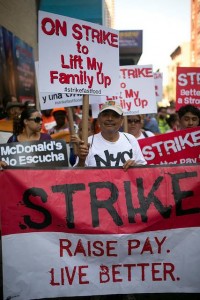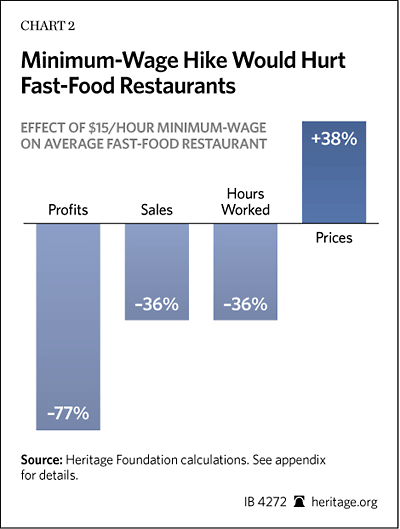EspañolWhenever I read news related to the minimum wage, or any wages defined by political power instead of the market, I wonder: what drives authorities, trade unionists, and the usual do-gooders to be so unambitious?
People need food, shelter, clothing, and entertainment. But do they really believe that a mere mandate of US$15 per hour can provide all of these essentials? Why not demand a salary of $20, $50, or even $1,000 per hour?

The Service Employees International Union (SEIU) has just launched a campaign to raise the minimum wage for fast-food workers, who currently earn about $9 per hour.
On Thursday, September 4, hundreds of protests sprang up across the United States, as fast-food workers and elderly caregivers banned together to call for higher wages.
Thousands of employees left their jobs across 150 US cities in support of better pay and stronger unionization. The impact was moderate: a few restaurants closed their doors, and more than 400 protesters were arrested. Despite national media coverage of the event, the minimum wage remained unchanged.
More Problems than It Solves
“There has to be civil disobedience because workers don’t see any other way to get $15 an hour and a union,” Kendan Fells told USA Today. Fells is the director of Fast Food Forward, a group backed by the SEIU, which organized Thursday’s protests.
Many will point to Fells’ apparent lack of basic economics and a misunderstanding of how wages are determined, but in reality, the problems here are far greater.
The minimum wage has proven to be a historical rallying point among unions. However, instead of helping to improve the welfare of US workers, unions often encourage them to conspire against themselves. In truth, it is the trade unions themselves that have the most to gain from an increase to the minimum wage; they gain bigger bank accounts, claim victory for the “workers’ struggle,” and boost their political capital. Meanwhile, workers are being led to dig their own graves.
Although often presented as the income base for workers, the minimum wage actually serves as a ceiling that blocks minorities, youth, and low-skilled workers.
The reality is that an increased minimum wage generates unemployment, discourages the creation of new jobs, and primarily affects the most vulnerable sectors of society. Although often presented as the income base for workers, the minimum wage actually serves as a ceiling that blocks minorities, youth, and low-skilled workers from accessing a more competitive labor market.
In order to understand the minimum wage’s pernicious effects, it is necessary to understand the basics of wage formation. No employer will pay an employee more than what the worker’s productivity dictates: if a worker produces $10 worth of value for a company in an hour, any salary above that number would mean financial ruin for the company, and consequently, unemployment for the worker.
Wages, like all other prices in an economy, are determined by the fluctuating relationship between supply and demand.
Therefore, an increase to fast-food worker wages would trigger increased food prices. According to a report by the Heritage Foundation, the wage increase demanded during Thursday’s demonstrations would result in a 38 percent increase in product prices, and a 77 percent decrease in restaurant profits.
“Most [US] Americans eat fast food because they want a quick and inexpensive meal. If fast-food restaurants raised their prices, many of their customers would either eat at home or go to more expensive restaurants.”

Still, not everyone considers a weakened fast-food sector as a negative proposition. Olga Khazan argues in the Atlantic that an increase in fast-food prices could help to solve the US “obesity problem.”
Khazan mentions several studies that arrived at a similar conclusion: A 10 percent increase in fast-food prices led to drop in demand between 7.4 and 10 percent. Fewer people eating fatty foods will then mean more people living a healthier lifestyle.
Khazan’s basic points about the promotion of a healthier lifestyle are based on the same paternalistic arguments that justify artificial wage setting in the first place: social planners and technocrats are better suited to decide what is best for the public than individuals themselves.
Moreover, Khazan fails to mention that a decline in sales would mean the dismissal of thousands of workers, who will now have greater difficulty being hired by other companies, given the industry-wide raise in the minimum wage.
In much the same way that wage laws displace workers who are on the margins of productivity, they also harm individuals looking to escape “wage slavery” through entrepreneurial ventures.
Wage standards are set for all companies across the board, without distinctions between big corporations and small businesses. Therefore, Walmart or McDonald’s could likely weather a slight increase in wages, while a small business, without extensive financial support, would be driven out of the market.
Bureaucrats and legislators determining wages destroys market opportunities. It only adds to the dozens of constraints that already limit small-business entrepreneurs. Sheldon Richman, vice president of the Future of Freedom Foundation, explains:
Occupational licensing restricts entry into many kinds of work by raising the cost of going into business. Zoning restrictions prevent people from using their homes for commercial purposes. Restrictions on street vendors and cabbies quash small-scale entrepreneurship. Intellectual-property law inhibits or harasses those whose products might be construed as violating patents or copyrights. Government land holdings make land artificially more costly. Taxes and regulations impose greater burdens on would-be entrepreneurs than on large, established businesses.
While progressives, unions, Democrats, and a few Republicans continue to promote greater state involvement in the wage debate, the damages not immediately seen will continue to harm those that interventionists claim to protect.
 Versión Español
Versión Español












